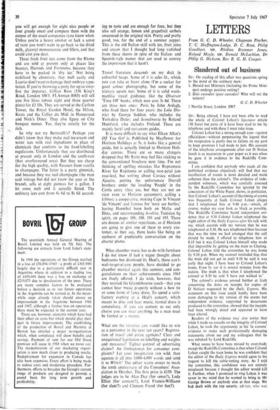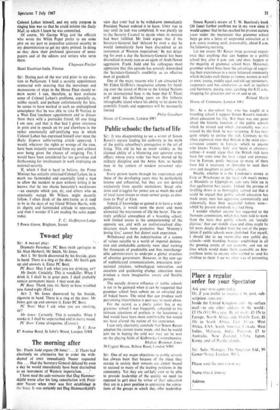Sir: Being abroad, I have not been able to read
the whole of Colonel Lohan's Spectator article (30 June) but parts of it have been read to me by telephone and with these 1 must take issue.
Colonel Lohan has a strong enough case—against officialdom—without perpetuating the legend that his resignation is partly due to failure on my part to keep promises I had made to him. His account of the telephone arrangements after our D Notice lunch is as inaccurate in your paper as it was when he gave it in evidence to the Radcliffe Com- mittee.
I am confident that anybody who reads all the published evidence objectively will find that my recollection of events is more detailed and more coherent than the colonel's. The evidence of inde- pendent witnesses, which was carefully assessed by the Radcliffe Committee but ignored by the concoctors of the White Paper, shows, in particular, that Colonel Lohan's account of the timing of events was frequently at fault. Colonel Lohan alleges that I telephoned him at 9.40 p.m.—which, of course, makes my case look as black as possible. The Radcliffe Committee heard independent evi- dence that at 9.38 Colonel Lohan telephoned the night editor of the Daily Express after his talk with me, which accords with my version that he was telephoned at 9.30. He was telephoned then because that was the time we had arranged that the call should be made. I offered to telephone him at 8.15 but it was Colonel Lohan himself who made that impossible by getting on the train to Charing. Colonel Lohan told the committee he was home by 9.10 p.m. When my counsel reminded him that the train did not get in until 9.10 he said it was early that night. I have been to Colonel Lohan's home. Even by car it is several minutes from the station. The truth is that when I telephoned the colonel at 9.30 he said 'I have just walked in.'
The colonel's evidence proved further at fault concerning the dates on receipts for copies of D Notices requested by the Daily Express. His statement on this issue could hardly have been more damaging to my version of the events but independent evidence, supported by documents produced to the committee, showed that the receipts had been wrongly dated and appeared to have been altered.
Readers of the evidence may also notice that while I made no assaults on the integrity of Colonel Lohan, he took the opportunity in his 'in camera' evidence to make such professionally damaging statements about me and my colleagues that be was rebuked by Lord Radcliffe.
What seems to have been missed by everybody except the Radcliffe Committee is that when Colonel Lohan caught the train home he was confident that the editor of the Daily Express would agree to his requiest to kill the cable-vetting story. As I told the committee, this confidence was not entirely misplaced because I thought the editor would kill it. Further, when I promised to ring Lohan it was never in my mind that he wanted to bring in. Mr George Brown or anybody else at that stage. We had dealt with the top security adviser, who was Colonel Lohan himself, and my only purpose in ringing him was so that be could inform the Daily Mail, to which I knew he was committed.
Of course, Mr George Wigg and the officials who wrote the White Paper prefer to see some plot on my part to jeopardise national security in my determination to get my story printed. In doing so they show their profound ignorance of news- papers and of the editors and writers who serve them.







































 Previous page
Previous page